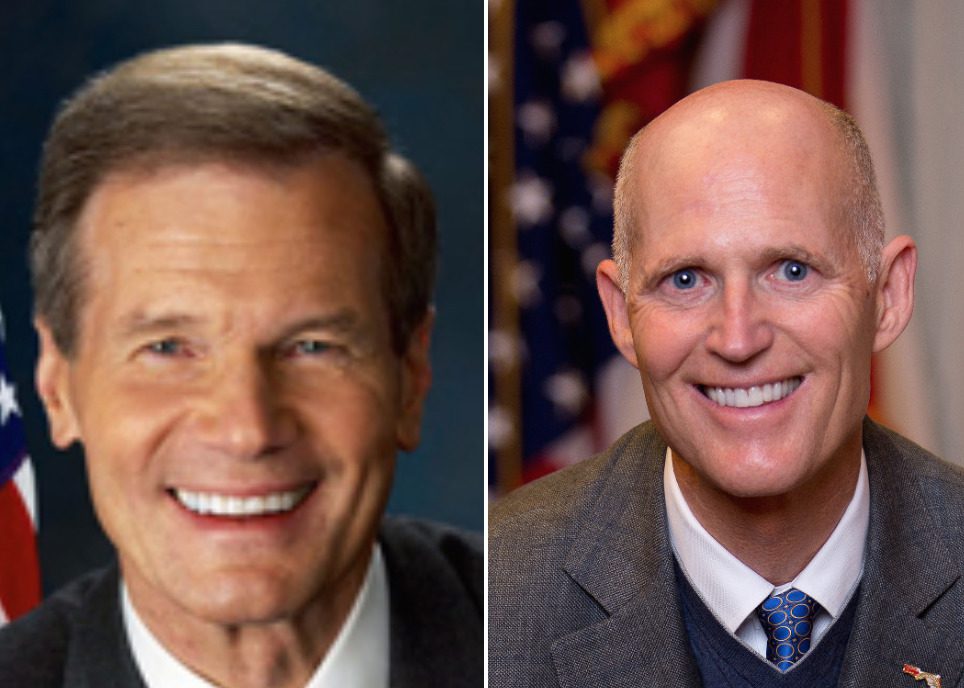…and three reasons the senator might lose
By Nick Carper, Guest Columnist
Sen. Bill Nelson’s re-election campaign will be one of the most closely watched races nationally in 2018. It is widely expected that Gov. Rick Scott will enter the race to unseat Nelson, setting the stage for a dramatic showdown that will be both highly nationalized and astronomically expensive.
Democrats will have to defend 10 U.S. Senate seats in states that Trump carried, Florida included, in the first real test of both parties in the Trump era. Republicans would love nothing more than to finally defeat Florida’s last Democrat holding a statewide office.
Below are three big factors that favor Sen. Nelson in this pre-campaign period and three factors that may point to trouble for Nelson and other Democrats.
Working in Bill Nelson’s Favor
- The incumbent president’s party almost always performs poorly in midterm elections.
The natural inertia of midterm elections tends to move against the sitting president’s party. Only three times in the last century (in 1934 in the midst of the Great Depression, in 1998 with the Republican push to impeach Bill Clinton in full swing, and in 2002 immediately after the 9/11 attacks) has the incumbent president’s party gained House seats in a midterm. Modern polarization seems to have only exacerbated this effect, as the last three midterms have all seen major waves against the president’s party. A president as prone to controversy and seemingly poised for overreach as Trump may well set the stage for a sizable Democratic bounce-back in 2018, which could provide enough wind at Nelson’s back to carry him across the finish line.
- Despite twice winning statewide office, Rick Scott’s campaign skills still leave much to be desired
Rick Scott has been elected governor twice, but both times he eked out extremely narrow victories despite strong Republican tailwinds in 2010 and 2014, winning by 1.2 percent and 1 percent, respectively. He also had the luxury of facing two capable yet flawed candidates in Alex Sink and Charlie Crist. Sink in 2010 failed to fully distinguish herself from Scott in the minds of voters, and in 2014 Charlie Crist continually fed the narrative of his own inauthenticity that plagues him even today.
Even after eight years as governor, Scott is still an unpolished speaker. Gov. Scott’s infamous awkwardness on the stump may be exposed against a more seasoned campaigner like Nelson, who has been winning elections in Florida since 1972.
- Nelson is the right kind of Democrat to win statewide in Florida
In many ways, Bill Nelson is the final vestige of a bygone era of Democratic dominance in Florida politics. A true North Florida Cracker with a Southern gentleman’s drawl, Nelson may not win outright in the panhandle and North Florida like Democrats of old, but he knows how to win enough votes there to keep from bleeding out. Unlike many Florida Democrats in a party increasingly focused on urban South Florida, Nelson knows how to speak the language of these voters. He intuitively knows how they think and what their concerns are. Even chipping away slightly at Republican vote totals in these areas, which provided Donald Trump’s margin of victory in 2016, is critical in a state regularly decided by such narrow margins.
Why Bill Nelson Could be in Trouble
- The Democratic coalition is now reliant on unreliable voters
As was laid bare in 2010, 2014, and 2016, the modern Democratic coalition is made up almost entirely of demographics least likely to vote, particularly in midterms. The ethnic/racial minorities and young voters that carried Barack Obama to the White House have yet to demonstrate a willingness to show up when Obama isn’t on the ballot. Meanwhile, the Democratic hemorrhaging of white and older voters (who vote more reliably) has reached critical mass, making Democrats dependent almost entirely on the “Obama coalition.”
In an era of unprecedented ideological polarization, even a wounded GOP may be able to mitigate historical trends against the incumbent president’s party on turnout alone. Nelson ran ahead of the Democratic presidential ticket in both 2000 and 2012. He also ran far ahead of the Democratic gubernatorial candidate Jim Davis in 2006, thanks in large part to his holdover appeal with the former strongholds of old time Southern Democrats. If Trump has permanently realigned enough of these voters to the GOP, Nelson could find himself in trouble. Combine the Democrats’ white flight with poor participation from young and minority voters without Obama on the ticket (as we saw in 2010, 2014, and 2016) and Nelson’s path becomes tenuous.
- Rick Scott has an uncanny ability to defy expectations
Starting with his long-shot bid for governor against Attorney General Bill McCollum in the 2010 GOP gubernatorial primary, Rick Scott has been dismissed as an underdog at best and gadfly at worst in every race he’s run. No one (at first) expected Scott to pull off a victory against McCollum, and many Democrats celebrated Rick Scott’s nomination thinking Alex Sink would cruise to victory against someone with his baggage. In 2014, many believed Scott was an accidental governor, the product of a once-in-a-generation Tea Party wave in 2010 who would be easily dispatched by former governor and Republican-turned independent-turned Democrat Charlie Crist. But for a third time, Scott defied expectations and beat Crist by a similar margin to his victory over Sink four years prior.
Gov. Scott is going to be underestimated once again by a lot of Democrats who will look at his record as governor and convince themselves he couldn’t possibly beat someone with Nelson’s background and stature. But isn’t that the same mistake Democrats have made for two decades?
Another reason Scott was able to exceed expectations was his ability to parlay his sizeable personal fortune against McCollum, Sink, and Crist. He would have no problem doing so against Nelson if need be, but it may not be necessary. The race will be a top spending priority for national Republicans and the White House, as Scott was an early supporter of Trump even with two Floridians (four if you count transplants Ben Carson and Mike Huckabee) in the presidential race. A Scott victory instantly provides Trump with a reliable Senate ally in a Republican majority that still contains some Trump skeptics. President-elect Trump values that kind of loyalty and will prioritize this race heavily.
- Nelson could be damaged by a Sanders-esque insurgency.
The Bernie Sanders movement has not gone quietly into that good night along with the senator’s presidential ambitions. A movement bearing resemblance to a Democratic Tea Party has taken hold among some of the more vocal and strident elements of the liberal base, and some are already calling for a primary challenger from Nelson’s left. Pam Keith, a long shot candidate who very nearly beat Congressman Alan Grayson for second place behind Patrick Murphy in the 2016 Democratic U.S. Senate primary, despite a fraction of Grayson’s resources or name ID, is rumored to be poised to run against Nelson.
Even if a candidate like Pam Keith or progressive activist Tim Canova (who waged a quixotic challenge to Congesswoman Debbie Wasserman-Schultz in 2016 and has kept his profile high with left-wing activists) doesn’t have a realistic shot at unseating Nelson in the primary, or necessarily winning a significant portion of the vote, the Sanders-Clinton contest showed how much damage a leftist insurgency can do to an eventual nominee. If Nelson is forced to expend energy and resources fighting off a challenge from his left, he may limp into the general election weakened and cornered into taking positions less palatable to mainstream Floridians.
Parting Thoughts:
Sen. Nelson will be 76 years old on Election Day 2018. While that may not be as old as some of the Senate’s elder statesmen (Sen. John McCain, recently re-elected, is age 80), Nelson underwent successful surgery for prostate cancer in 2015. Nelson is surely among America’s most physically fit. He is a notoriously avid jogger, and as recently as 2015 was easily able to do 46 pushups in Illinois Sen. Dick Durbin’s office to make good on a bet after the Tampa Bay Lightning lost the Stanley Cup. Nelson has given every indication that he is in good health and is running for re-election.
A smart move by Gov. Scott, who will be 66 years old in December 2018, would be to officially jump into the race extremely early, as early as the next few weeks, and begin putting pressure on Nelson. Drawing the race out would allow Scott’s camp to leverage its aforementioned financial resources in a big way.
Even so, Nelson’s decades of experience winning races in Florida and historical precedent for partisan backlash against a new president may prove too much for Gov. Scott and national Republicans to overcome. Nelson will start the race as a slight favorite, but he undoubtedly faces the toughest challenge of his Senate career.

Nick Carper, who wrote this guest column for Alive Tampa Bay, is an unabashed political junkie who follows campaigns and politics with a fanatical enthusiasm, which leads his friends and loved ones to regularly question his sanity. A native of rural West Virginia who was chased south by an undying disdain for winter, Nick has lived in Pinellas County since 2003. He graduated from USF St. Petersburg in 2010 with a B.A. in Political Science and USF Tampa in 2013 with a master’s degree in Public Administration. Beyond his love for all things politics, Nick is a heavy metal aficionado, avid fisherman, and a veteran of numerous political campaigns in the Tampa Bay area.


